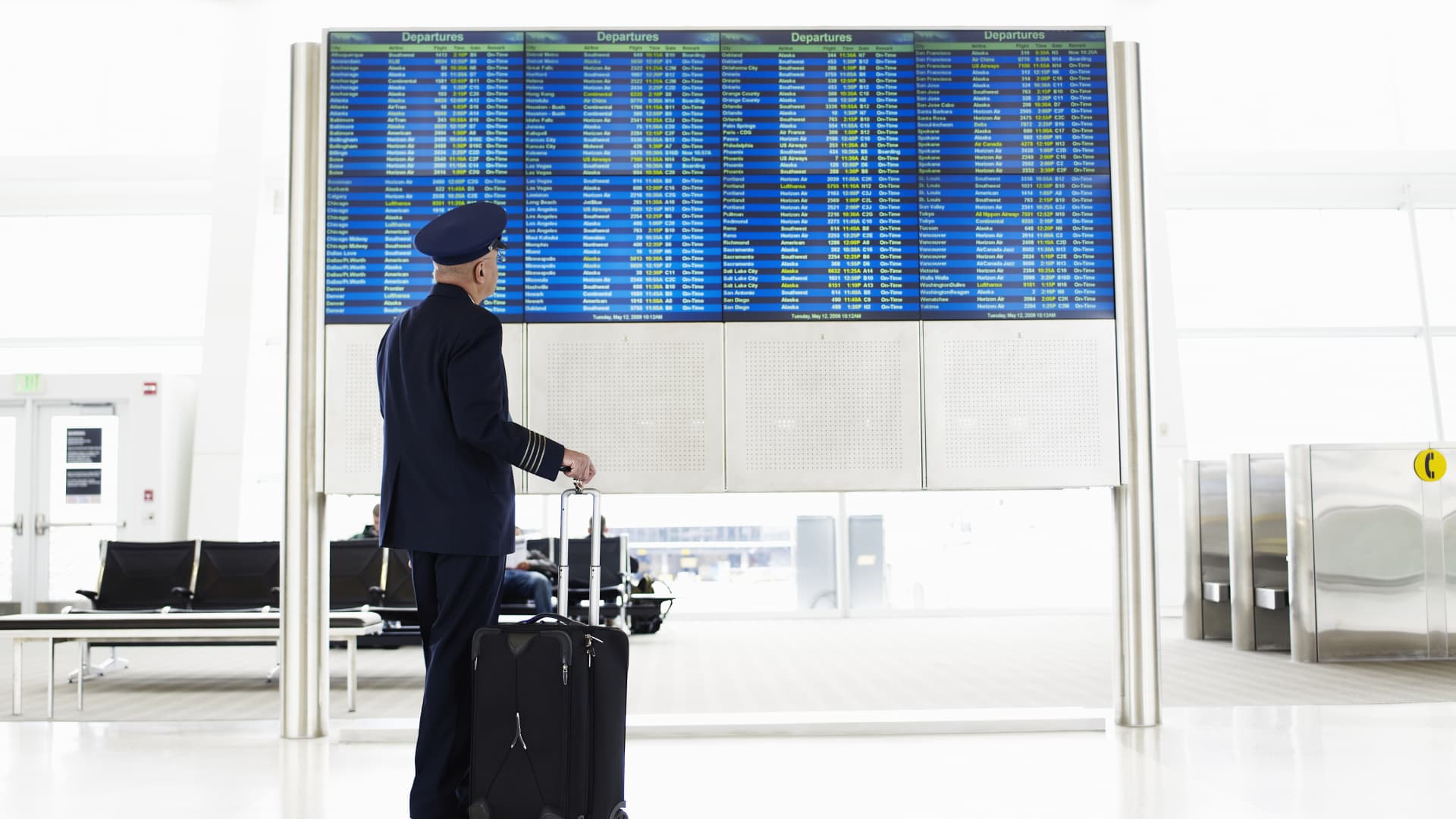A fight is brewing in Washington over whether the mandatory retirement age for airline pilots should be raised from 65.
The debate comes as baby boomers more broadly are reaching “peak 65” — the biggest number of Americans reaching that age in history.
With that wave, the U.S. is poised to broadly face the question: When is the appropriate age to retire?
More than 11,200 Americans will turn 65 every day — or more than 4.1 million every year — from 2024 through 2027, according to estimates from the Retirement Income Institute at the Alliance for Lifetime Income.
Age 65 has traditionally been thought of as retirement age. The milestone still marks the point at which individuals become eligible for Medicare coverage.
But for Social Security benefits, the full retirement age — when a qualifying worker is eligible for 100% of the benefits they earned — is moving to 67 for anyone born in 1960 or later.
More from Personal Finance:
If you want to age in place in retirement, here’s what to consider
What happens to your Social Security benefits when you die
How to better save for retirement in your 50s
Changing the retirement age is controversial, both in the U.S. and around the world. In France last year, pension reforms that raised the retirement age from 62 to 64 sparked fierce protests.
In the U.S., the Senate is expected to mark up a Federal Aviation Administration reauthorization bill that will consider the pilots’ retirement age. The House version of the legislation moved the retirement age to 67.
This week, a Federal Aviation Administration official told Congress the agency would like to have data to support the move to a higher age. The Air Line Pilots Association, a union, opposes any change and wants to keep the age at 65.
But a group of pilots called Raise the Pilot Age has come together to support increasing their ability to work to age 67.
“Bottom line, I want to keep flying,” said Barry Kendrick, who is president of the non-profit group.
‘I’ve taken a 60% pay hit’
Kendrick, who recently turned 66, is a professional pilot who has retired from a major airline flying a Boeing 777 International.
Kendrick can and does still fly smaller planes. But he is ineligible to fly with name brand airlines that usually appear on consumers’ tickets. Those companies also typically pay the most, he said.
“I’ve taken a 60% pay hit to do what I’m doing now,” Kendrick said.
Kendrick has recently passed physical and cognitive tests necessary to fly.
“A smaller airplane is a different environment,” he said. “That’s actually physically more taxing than what I was doing before.”
Kendrick has not claimed Social Security retirement benefits, since he won’t get full benefits until his full retirement age of nearly 67. He does have the option to claim his benefits now, but they would be permanently reduced.
Other occupations generally do not face federally regulated retirement ages.
But by shifting the Social Security full retirement age to 67, Congress has suggested workers wait at least until that age. Retirement beneficiaries stand to get the biggest benefits if they wait until age 70.
Experts say those retirement age rules, which were enacted in 1983 and are still getting phased in today, may change.
Social Security faces an imminent deadline by when changes must happen. The program’s combined trust funds are projected to run out in 2034. The projected depletion date for the retirement fund is sooner in 2033, according to the Social Security Administration.
Beneficiaries will face a more than 20% benefit cut if nothing is done by those deadlines.
‘We have to do this now’
To fix the shortfall, lawmakers may implement tax increases, benefit cuts or a combination of both.
Raising the retirement age would be a benefit cut. Such a change would encourage workers to retire later, and therefore continue to pay money into the program, or take reduced benefits. While that would positively affect Social Security’s finances, the change would result in a 20% benefit cut across the board to lifetime benefits, the Center on Budget and Policy Priorities has found.
Those who retire at the earliest eligibility age — 62 — could see a 43% reduction from their full benefit, according to the think tank.
The sooner any changes are passed, the more time there is to phase them in, as with the current shift to the retirement age of 67.
“We have to do this now,” said Jason Fichtner, a former Social Security Administration official who currently serves as chief economist at the Bipartisan Policy Center and executive director of the Retirement Income Institute.
“We probably have a four-year window, being optimistic, to really start making plans,” Fichtner said.
The outcome of this year’s presidential race may help determine what happens in that time.
While Republican presidential candidate Nikki Haley has suggested raising the retirement age on the debate stage, the top candidates — President Joe Biden and former President Donald Trump — have vowed to protect the program.
In the meantime, Congress has pushed up the retirement threshold for required minimum distributions to age 73, notes Howard Gleckman, senior fellow at the Urban-Brookings Tax Policy Center.
Because a worker’s personal tax bracket is based on distributions from retirement accounts and earned wages, a lower RMD age can be a disincentive to work, he noted.
“It’s not as if Congress is unaware of the fact that people work longer and live longer,” Gleckman said. “But when it comes to Social Security, it doesn’t want to make the decision that everybody knows it needs to make.”
Those changes could include raising the Social Security retirement age. However, lawmakers would have to keep in mind that while white collar workers may be able to extend their careers, people who work in more physically taxing jobs may not be able to work longer. To address that, Congress may compensate by providing more generous benefits for low-income workers, Gleckman said.
